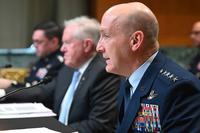The chairman of the Senate Armed Services Committee on Thursday blasted the U.S. Navy's Ford-class aircraft carrier program as an acquisition debacle.
Sen. John McCain, a Republican from Arizona who served as a naval aviator during Vietnam, didn't waste anytime launching into his criticism of the sea service's $40 billion effort to develop the first three new supercarriers.
"The Ford-class aircraft carrier program is one of our nation's most complex and most expensive defense acquisition projects," he said in his opening statement during a hearing on the matter. "It's also become, unfortunately, one of the most spectacular acquisition debacles in recent memory -- and that's saying something."
While the USS Gerald R. Ford (CVN 78), the first ship in the class, is scheduled to be delivered to the Navy in May -- after more than a dozen years of development -- the second ship is five years behind schedule, McCain said. What's more, the acquisition program is estimated to be more than $6 billion over budget -- and questions remain about the reliability of core systems.
The senator criticized the lack of accountability among officials in the Navy, Pentagon and even Congress for the schedule delays and cost overruns. In a clear shot to the builder, Huntington Ingalls Industries Inc., McCain said the cost of the program is so out of control that it may force the U.S. to change how it buys such ships in the future.
"We simply cannot afford to pay $12.9 billion for a single ship," he said. "If these costs are not controlled, we must be willing to pursue alternatives that can deliver similar capabilities to our warfighters on time and on budget.
"We must be willing to question whether we need to go back to building smaller, cheaper aircraft carriers that could bring new competitors into this market," he added. "We might even have to consider re-balancing our long-range strike portfolio with fewer carriers and more land-based or precision-guided weapons. If we can't do better, everything must be on the table."
Katrina McFarland, assistant secretary of defense for acquisition, said the program has largely been "stabilized."
Sean Stackley, assistant secretary of the Navy for research, development and acquisition, said the Ford-class carriers are hugely complex, will be in service until 2080 and must have the technology to "defeat the future threat" but "at a cost that the nation can bear."
J. Michael Gilmore, the Pentagon's top weapons tester, said low or unknown reliability and performance of the such new technologies as the advanced arresting gear (AAG), the electromagnetic aircraft launch system (EMALS), the dual band radar (DBR), and the advanced weapons elevators (AWE) are "significant risks."
Paul Francis, a managing director at the Government Accountability Office, the investigative arm of Congress, said in prepared testimony that CVN 78 "is unlikely to achieve promised aircraft launch and recovery rates as key systems are unreliable. The ship must complete its final, more complex, construction phase concurrent with key test events. While problems are likely to be encountered, there is no margin for the unexpected. Additional costs are likely."









